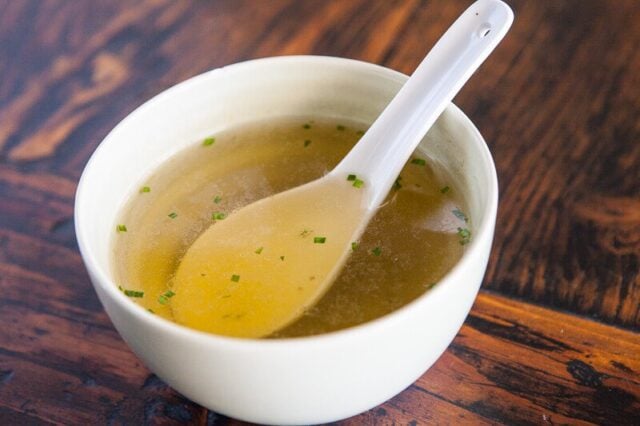If you slow cook the bone it draws out the collagen, marrow, and other healing elements from the bones, including amino acids, minerals, glycine, and gelatin—which helps heal the gut and reduce inflammation for the whole body.
Collagen, the protein matrix in bones, tendons, ligaments, and other flexible tissues, is broken down during the cooking process into another protein called gelatin. Gelatin is the reason properly prepared broth congeals in the fridge. This gelatin has in it the raw materials to rebuild your own connective tissue, especially tendons (which connect muscles to bones) and ligaments (which connect bones to each other).
Another benefit of bone broth for joint health comes from glycosaminoglycans (GAGs), a family of carbohydrates found in bones and connective tissue that show interesting effects in reducing joint pain. One of these GAGs, hyaluronic acid, is an effective treatment for osteoarthritis.

Bone broth helps in digestion by containing glycine, because it stimulates the production of stomach acid. Who may need more stomach acid, you ask? People who have acid reflux do because acid reflux is actually a problem of too little stomach acid, not too much. By prompting your body to secrete more stomach acid, glycine can help prevent or treat this painful and potentially dangerous problem. This makes bone broth a delicious supplemental food for anyone suffering from acid reflux, IBS, or FODMAPS intolerance.
Adding to its metabolic virtues, glycine is also an important component of bile acid, which is necessary for fat digestion in the small intestine, and also helps maintain healthy blood cholesterol levels. Especially for people who are new to Paleo and switching from a carb-based to a fat-based diet, this has the potential to keep the digestive process running a lot more smoothly.
Glycine isn’t the only useful protein for gut health, either. glutamine, another amino acid found in bone broth, is a natural remedy for “leaky gut,” that unpleasant and dangerous condition where the barrier between your gut and the rest of your body isn’t working properly, allowing molecules that should stay inside the gut to cross over into the bloodstream and potentially set of a cascade of autoimmune reactions. Glutamine helps maintain the function of the intestinal wall, preventing this damage from occurring.
Glycine also helps in detoxification because it supports the liver in removing anything dangerous from the body.
Glycine is also necessary for the synthesis of glutathione and uric acid, the body’s most important endogenous antioxidants.
Yet another detox-related benefit is that glycine helps clear out excess methionine, another amino acid found in large quantities in eggs and muscle meat. Methionine is an essential amino acid, but too much of it can raise blood levels of another amino acid called homocysteine, and the process of breaking down homocysteine increases the body’s need for B vitamins (thus increasing the risk of B vitamin deficiency even if your intake is adequate). Glycine from broths and cartilage can help break down homocysteine without the need for B vitamins.
Bone broth is extremely high in minerals. Bones from land animals are rich in calcium, magnesium, potassium, and phosphorus, and fish bones also contain iodine. We know that at least some of this mineral content leaches out into the water, because the bones are crumbly and demineralized when the broth is done cooking – often they’re so weak that they’ll fall apart if you put any pressure on them. If you use smaller bones, like chicken or fish, they’ll sometimes even entirely dissolve into the stock.
Another interesting anti-inflammatory benefit of the proteins in bone broth is more rapid recovery from injury. Under the stress of an injury or disease, the body’s needs for these amino acids increases and bone broth is perfect for supplementing this increased need for the body to repair.
So the old advice of drink soup when you are sick still stands. Drink soup when inflamed, when joints hurt, to heal the gut or when recovering from an injury as well! If you don't want to make your own bone broth there's a great organic bone broth place in NYC, Brodo and online, even though it comes in plastic, The Osso Good Co.
No comments:
Post a Comment